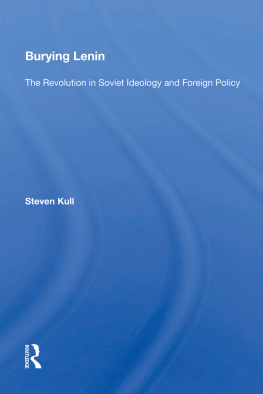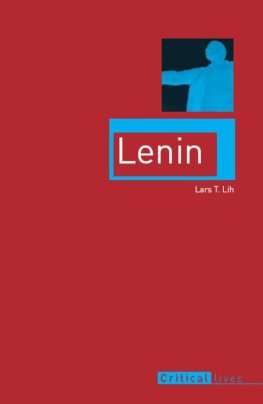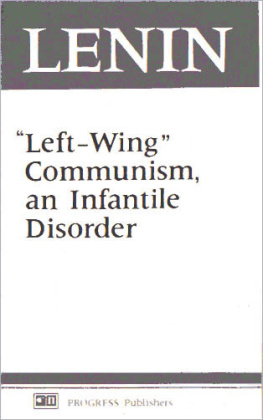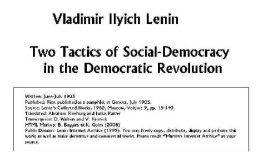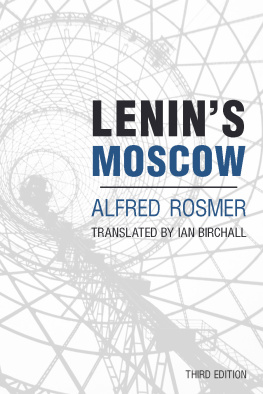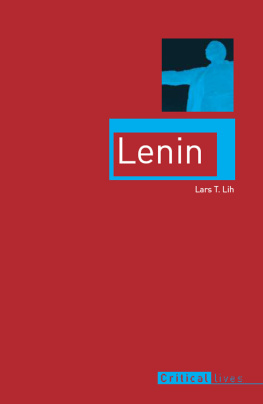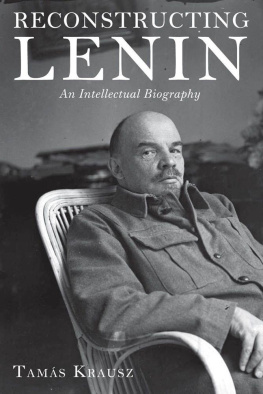First published 1992 by Westview Press
Published 2018 by Routledge
52 Vanderbilt Avenue, New York, NY 10017
2 Park Square, Milton Park, Abingdon, Oxon OX14 4RN
Routledge is an imprint of the Taylor & Francis Group, an informa business
Copyright 1992 by Taylor & Francis
All rights reserved. No part of this book may be reprinted or reproduced or utilised in any form or by any electronic, mechanical, or other means, now known or hereafter invented, including photocopying and recording, or in any information storage or retrieval system, without permission in writing from the publishers.
Notice:
Product or corporate names may be trademarks or registered trademarks, and are used only for identification and explanation without intent to infringe.
Library of Congress Cataloging-in-Publication Data
Kull, Steven.
Burying Lenin: the revolution in Soviet ideology and foreign
policy / by Steven Kull.
p. cm.
Includes index.
ISBN 0-8133-1501-8 ISBN 0-8133-1500-X (pbk.)
1. Soviet UnionPolitics and government1985- . 2. Soviet UnionForeign
relations1985- . 3. Perestroika. I. Title.
DK288.K85 1992
327.47dc20 91-45077
CIP
ISBN 13: 978-0-367-00470-5(hbk)
A turning point for Russia occurred in 1917 when the Bolsheviks came to power, espousing the communist ideology of German social philosopher Karl Marx. The Russian communists turned Marxism-Leninism into a totalitarian system that eventually dominated a widespread empire and influenced the development of countries far from Soviet borders.
A second watershed was the fall of Marxism-Leninism in the Soviet Union in the late 1980s and early 1990s and with it the nearly bloodless dissolution of the Soviet empire.
Many causes have impelled this most recent change in the USSR. Economic difficulties and military confrontation with the West created pressure for change in Moscow. But the most important reason for the relatively peaceful nature of the change is that the revolution in the Soviet Union has been a revolution in thinking. A wholesale change in thinking among the Soviet professional, political, and intellectual elite enabled the changes to occur with very little bloodshed. This change brought new policies to fruition and gave them momentum over time.
Soviet President Mikhail Gorbachev had an instinct for change when he came to power in 1985. But it was the advisers, experts, and political figures around him who conceptualized the change and gave it content in various areas of political life. These individuals moved the change a head, sometimes slowed it down, and reshaped it during the past six years.
Nowhere has this change in thinking been more evident and of more importance for the West than in the area of foreign and defense policy. New thinking loosened Soviet control over Eastern Europe and retracted Soviet influence in the developing world. Soviet military strength and the intention to use force has diminished to the point that the West has been able to dramatically reduce its defense effort and presence abroad.
But, as Steven Kull describes the evolution in Soviet thinking in this book, the change has not been instantaneous or simple. Different streams of thinking have persisted among the Soviet foreign policy elite and within the individuals responsible for making policy. Kull, Jennifer Lee, and I conducted extensive interviews with members of the Soviet foreign policy elite during the crucial 1988-1991 period when Soviet foreign policy altered dramatically. This was the period during which the Soviets pulled out of Afghanistan, the Brezhnev Doctrine was renounced, and the Berlin Wall fell.
We identified three distinct attitudes held by members of the Soviet foreign policy making community during that critical, evolutionary period of time. They were: new thinking, the strong advocacy of a nonmilitary approach to foreign policy; traditional Marxist-Leninist thinking, which stressed the dangers of abandoning traditional policies and sought to slow down the change; and a third stream, great-power realism, which saw the objectives of Soviet policy as being the pursuit of classical geopolitical and economic interests, relatively free from either new or old ideologies.
The approach of this study was to press Soviet policymakers to find the limits of the changes in their thinking, then to push them to present their rationales for the remaining vestiges of traditional thinking. Through this process, the three streams of thinking (and the way they were often intertwined in the thinking of individual policymakers) emerged.
We saw the thinking of individuals evolve over the three-year period during which we conducted the interviews. For instance, we would interview people and find that they balked at some major change, such as the reunification of Germany. A few months later we would return and find that even that mental barrier had come down in the meantime. Perhaps most excitingly, we also saw Soviet policy change in response to the evolution in thinking. A change in the thinking of individual policymakers often found expression a few weeks or months later in a shift in the official Soviet position.
It was evident from the interviews that the change was quite wrenching for Soviet policymakers who had been schooled for their entire lives in Marxist-Leninist ideology. Giving up traditional ways of thinking was, as Kull points out, tantamount to giving up a religion for many of them, and it produced a great deal of tension. Sometimes their body language was extraordinary in the interviews. For example, there was the senior expert who literally twisted himself into a pretzel on his chair and hugged himself as he expressed his ambivalence about the changes in Soviet policy.
As interviewers, we were surprised when we encountered particularly passe expressions of traditional thinking, like the journalist who told us in 1988 that he still thought there would be justification for Soviet military intervention in, of all places, Yugoslavia. But we were impressed when an individual took the first cautious steps beyond the limits of official Soviet policy, supporting, for instance, German reunification.
Steven Kull's book is a portrait of a painful but exhilarating period of change seen from the most personal level of the individual Soviet policymaker. It provides not only a specific analysis of the evolution of Soviet new thinking about defense and foreign policy but more general insights into the process of changes in beliefs.
So much has happened since this process of development began in earnest in 1988: the attempted coup against Mikhail Gorbachev in August of 1991, the ensuing devolution of Soviet power to the republics, and the formation of the Commonwealth of Independent States. For example, the August 1991 coup attempt was a sign that traditional thinking, as described in this book, is not entirely dead.
Thus, the various streams of thought examined here will influence the foreign and defense policies of the Commonwealth and the various republics, and indeed, are already doing so.
For example, in Ukraine and in other nuclear republics, a tension is already visible between elements of new thinking and great-power realism in the way that these republics handle the presence of nuclear weapons on their territory. New thinking impelled leaders of Ukraine to renounce nuclear weapons in the fall of 1991 and to call for a nuclear-free zone in their republic. Very quickly, however, great-power instincts began to assert themselves. Ukrainian leaders began to see the value of nuclear weapons in conferring status and power on the republic, especially as Ukraine competes with Russia for influence. So in the winter of 1991, Ukrainian leaders began to back away from their nuclear-free pledge. In his speeches and statements, Ukrainian President Leonid Kravchuk has sometimes espoused the new thinking point of view, and at other times he has articulated the great-power position.

